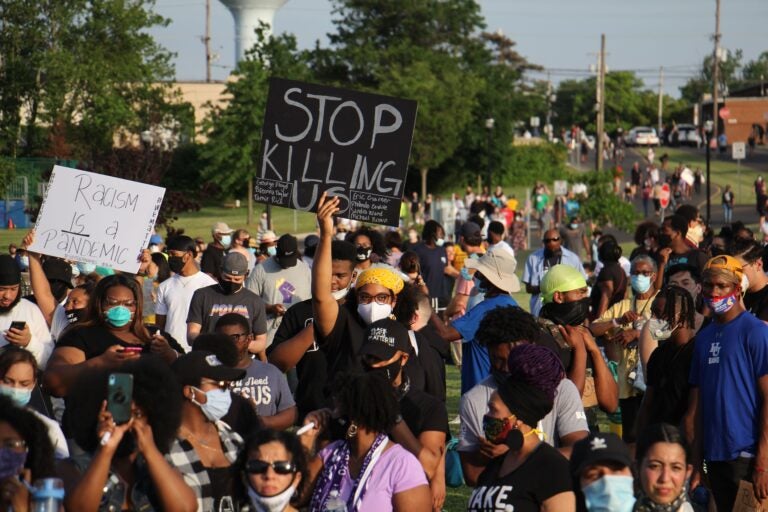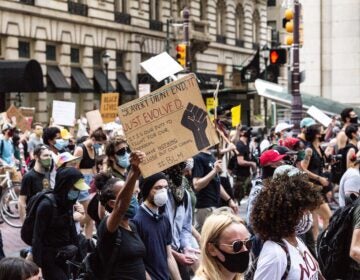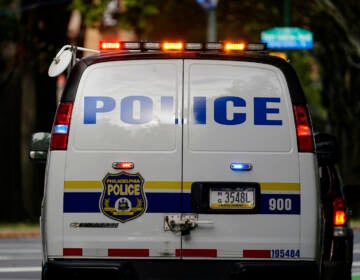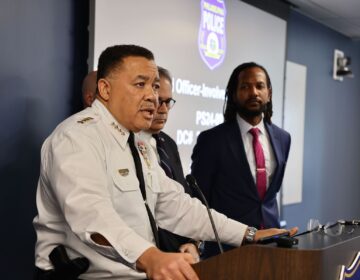How N.J. is trying to reduce police violence in the wake of George Floyd’s murder
N.J. was already in the midst of an effort to reduce police use of force against civilians when Floyd was murdered. Here’s where these efforts stand now.

Hundreds arrive at Pennsauken Community Rec Center for a march and vigil to remember George Floyd and others who died at the hands of police on Wednesday, June 10, 2020. (Emma Lee/WHYY)
When Minneapolis police officer Derek Chauvin murdered George Floyd while arresting him in May 2020, New Jersey was already in the midst of an effort to reduce the use of force against civilians.
The killing, which sparked national protests against police violence last summer, brought a new sense of urgency to what Garden State officials were trying to do and informed some of the policies they would impose on officers.
After a Minneapolis jury found Chauvin guilty this week of murdering Floyd — a rare conviction for an on-duty police killing — New Jersey authorities pointed to the state’s reforms as a partial solution to the epidemic of police violence against people of color.
“We must seize this moment, when the nation’s focus has turned to how our communities are policed, to ensure something meaningful comes from a man’s unnecessary death,” said state Attorney General Gurbir Grewal in a statement, “and to continue with urgency the reforms we have begun to policing practices in New Jersey.”
Here’s where these efforts stand, and what police reform advocates say needs to happen next:
Updating N.J.’s use-of-force policy
In December, Grewal unveiled a new statewide use-of-force policy, which was updated for the first time in two decades following input from interest groups and community members.
The policy, which takes effect at the beginning of 2022 after all officers have been trained on it, emphasizes de-escalation, and bars law enforcement officers from using deadly force except as a last resort. It applies to all 38,000 state, county, and local police officers in New Jersey.
Grewal said during a recent state Senate Budget and Appropriations Committee hearing that the updated policy, which forces police to “respect the sanctity of life” and have a “duty to always de-escalate,” would help restore trust in law enforcement.
“There’s been a crisis in confidence in policing,” the former prosecutor said. “There’s a gap in trust between law enforcement and communities across the country and in parts of this state.”
Still, the new policy doesn’t prevent officers from using deadly force on civilians when they feel it is necessary to protect themselves “or another person from imminent danger of death or serious bodily injury.”
Zellie Thomas, an organizer with Black Lives Matter in Paterson, said that is a major loophole that allows officers to continue using deadly force on people as long as they later claim it was because they feared for their lives.
“That’s where things get tricky,” Thomas said. “You can’t prove that an officer did not fear for their life.”
All officers also have a “duty to intervene” under the new policy, requiring them to step in if they see a fellow officer using illegal or excessive force on a subject.
In addition to Chauvin, three other former Minneapolis police officers have been charged with aiding and abetting murder and manslaughter for helping restrain Floyd during his arrest and doing little to prevent Chauvin from kneeling on Floyd’s neck for more than nine minutes, cutting off his ability to breathe.
New Jersey will require all law enforcement officers to go through one day of training in active bystandership “so we don’t have that video from Minneapolis happen in New Jersey, where three cops stood by while a fourth killed somebody,” Grewal said.
The Georgetown Innovative Policing Program and the law firm Sheppard Mullin developed active bystandership training for law enforcement officers, also known as ABLE, which has been used by the New York Police Department and agencies across the country. According to its website, ABLE builds on training developed by Dr. Ervin Staub, who conducted research and field experiments showing that bystander intervention skills can be learned.
Other facets of the state’s new policy could also help prevent a murder like Floyd’s from occurring in New Jersey, such as requirements to continually monitor the condition of someone who is being restrained and to take care “not to put sustained pressure on the neck or back.”
Still, Thomas said the updated policy has not had a major impact in his community, and that in cases of police violence that went to trial, it would still be up to the jury to decide whether an officer followed the rules.
“I think that many people aren’t aware that it has been updated. I think that most people don’t even know what the previous guidelines had allowed for and what the news ones do,” Thomas said. “I’m not sure if the new guidelines will affect anything.”
More public scrutiny
The state also recently rolled out the beta version of a new public-facing database of use-of-force incidents that it hopes will allow officials and the public to spot worrying trends in how New Jersey officers use force.
“You need oversight,” Grewal said. “The ultimate backstop to all of that is to give the public access to this as well.”
The AG’s Office and other authorities can use the database to monitor police agencies and individual officers and identify potential problems before they escalate. “We’re using it to retrain where we can, hold accountable where we must, and prosecute if we have to,” Grewal said.
The state’s new database came after NJ Advance Media put together its own database of use-of-force incidents based on public records. The investigation found a major racial disparity in how officers employed force: police in New Jersey were three times more likely to use force on Black people than white people.
The state is requiring all New Jersey law enforcement agencies to equip officers with body cameras by June, with $58 million in grants available for departments to help defray the cost of the devices and video storage. A new law also requires the state to investigate all deaths in police custody to eliminate local conflicts of interest.
Grewal also tried to compel law enforcement agencies to identify officers who committed serious disciplinary violations, but police unions sued, claiming it would harm officers, and the question is now pending before the New Jersey Supreme Court.
Lawmakers have proposed legislation (S-2656) to make all police disciplinary records public, but the bill has yet to have a hearing, according to the legislature’s website.
Is it enough?
Despite the ongoing efforts by New Jersey officials to change policies and add more transparency, controversial arrests and incidents of officers beating and killing suspects have continued in the Garden State.
A video of Perth Amboy police stopping Black and Latino teenagers and seizing their bicycles circulated on social media just this week, with critics slamming the officers for using their authority to enforce the minor offense of an unregistered bike.
Authorities announced in February they were investigating several Paterson police officers who were caught on camera beating 19-year-old Osamah Alsaidi.
Last May, just two days before Floyd was killed by Chauvin, a white New Jersey State Trooper killed Maurice Gordon, an unarmed Black motorist, during a scuffle on the Garden State Parkway. The case is ready to be presented to a grand jury, a spokesman for the attorney general said, but only some grand juries are operating virtually due to the COVID-19 pandemic.
Brooke Lewis, associate counsel at the New Jersey Institute for Social Justice, said she was “very happy” about the updated use-of-force policy, but also disappointed that lawmakers had not taken action on other police reform bills pending in the legislature.
Among them are bills that would permit the creation of civilian review boards with subpoena power and others that would ban the use of chokeholds by police.
“In the aftermath of George Floyd’s horrific murder, you would think that these would be pretty obvious reform that we could do here in New Jersey,” she said of the chokehold bills, “but we haven’t even had a hearing on those.”
Lewis added that, since attorney general directives can change with new administrations, it’s important for legislators to memorialize such policies into law if they want them to last.
Thomas, the Black Lives Matter organizer, applauded the Murphy administration for allocating more resources toward violence prevention programs and encouraged the state to provide more funding for community resources that could help reduce violence.
But he said New Jersey officials and lawmakers did not take calls last summer to defund the police seriously enough, and urged them to consider more sweeping changes to the state’s criminal justice system.
“Maybe policing as we know it is not the best route here in our country, and if there is something that could be created that is safer, and it creates safer and stronger communities, then we need to be bold and courageous enough to say, ‘You know what, let’s try to create something different,’” Thomas suggested.
“And not say, ‘We’re going to dig our heels into the ground just because police have always been here … so we can’t imagine what it’s going to look like if they’re not here anymore.’”

Get daily updates from WHYY News!
WHYY is your source for fact-based, in-depth journalism and information. As a nonprofit organization, we rely on financial support from readers like you. Please give today.






